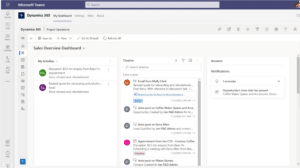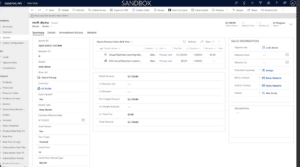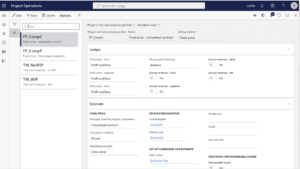Why Quoting & Billing Software Belongs in Any FSM Stack
quoting and billing software is a total game-changer for any field service company. Learn more about quoting and billing software today!
quoting and billing software is a total game-changer for any field service company. Learn more about quoting and billing software today!
Table of Content
Admittedly, there’s a lot of overlap between “quoting and billing” and accounting, finance, and time-tracking solutions.
Often, field service providers start with one platform that covers most of their bases, but may need additional modules or ISV solutions to fill very specific gaps.
For example, both field- and project-based work come with some unique challenges that impact quoting, billing, and, by extension, overall business performance.
In this piece, we’ll look at some of the benefits billing and quoting solutions bring to the FSM stack, and highlight a few different options for getting the features you need.
Historically, deal management has fallen under the purview of “sales operations.” But, businesses have finally come around to the idea that all departments, strategies, and processes are part of the same interconnected ecosystem.
As such, field providers are now looking at deal management as part of their broader FSM practice.
Deal management describes a process of overseeing and coordinating every aspect of a deal — from lead to prospect to customer to, hopefully, dedicated brand evangelist.
But, increasingly, orgs are investing more in deepening relationships post-conversion, capturing upsell and cross-sell opportunities, and continuing to deliver new value to existing customers so they stick around for the long haul.
Ultimately, it’s about meeting expectations (or legally-binding contract terms), delivering positive outcomes, and anticipating and adapting to ever-changing needs.
Naturally, D365 Sales comes with a long list of advanced features that enhance and accelerate the deal cycle — at every touchpoint within each stage.
On its own, most of the platform’s capabilities are designed to support “sales” on a more “conceptual level.” Meaning — it leverages AI to suggest actions, predict behaviors and outcomes, and flag at-risk deals so that reps can quickly take action.
As a standalone solution, D365 Sales won’t transform field service operations.
However, when it’s connected to the broader FSM stack, D365 Sales uses insights from those apps (and other connected data sources) to generate and qualify better leads and win more deals. More crucially, that “interconnectedness” makes it possible for field orgs to keep the promises made at each stage in the sales cycle – and, later, become solidified in customer contracts and SLAs.
D365 Project Operations also comes standard with several features aimed at improving deal management — beyond the initial close.
Capabilities include predictive forecasting, flexible pricing, and the ability to use real-time data to generate accurate quotes, estimates, and ETAs — during the initial sales process, as well as later on, as projects evolve and conditions inevitably change.
Here’s an example of how integrating D365 PO with D365 Sales and Finance might better support project teams by providing more insight into sales opportunities, activities, and pipeline performance.

You can also add D365 Field Service to the stack to gain a more “global view” into how all of these business units are working toward a common goal.
That means project leaders can access everything they need from Sales, Finance, Field Service, etc., from a single Teams chat/workspace, and use that information to set expectations with clients – and keep them in the loop re: disruptions or delays.
While the D365 Sales and Project Ops modules will certainly cover all your deal management needs (and then some), many field orgs only need a handful of features and may not be able to justify the extra investment.
Others might have industry-specific needs. Think — medical device manufacturers, real estate developers, or facilities management firms. At the SMB level, providers may need advanced capabilities they can’t get out-of-the-box with D365 BC.
Whatever the reason, ISV apps can fill critical gaps.
For example, UltiBuild works with D365 Finance and Supply Chain Management, and helps providers manage complex real estate and construction projects — and all the quotes, POs, subcontract agreements, and RFQs that come with the territory.
There’s also LeBit Commission, an ISV app designed to integrate commission-based billing for sales reps and agents into D365 BC workflows. Users can set up custom payment cycles, define commission rules for different customer, item, or sales rep groups, support multi-currency transactions, and automate calculations and basic workflows.
Arguably, the biggest benefit of quoting and billing software is the ability to generate accurate estimates for customers — in real-time.
As you might imagine, this is a big deal for sales teams, who often rely on estimates to nurture leads and close deals. Sure, some reps have no problem using bad or incomplete data to get prospects to commit to a long-term relationship. But, that’s not something you should be proud of.
Closing deals is one thing, but keeping your word is far more valuable. When customers realize you can’t meet the terms in their SLA, give them an accurate ETA, or provide any real transparency re: pricing, they’ll have no problem leaving you for someone else.
But, it’s important to understand that tackling “bad data problems” goes way beyond the sales department. It’s an org-wide issue that can cause devastating ripples across all business units — and anyone they deal with.
That means, what you’re really looking for is a platform that stamps out those problems at the source — before they take root and spread beyond your control.
Dynamics 365 Business Central comes with several features that support service management, quoting, and billing.
For instance, users can generate service quotes based on customer inquiries, assets, etc., then convert them into service orders upon approval. They can also use BC, as is, to manage customer relationships and sales opportunities.
On the enterprise side, you’ve got the D3565 F&O modules. But, you’ve also got ISV solutions like Zuora CPQ for Dynamics 365, which builds on the out-of-the-box capabilities of Dynamics 365 Sales.
This app aims to help orgs generate and deliver accurate quotes for any combination of services, projects, products, and subscriptions. It also integrates seamlessly with D365, Azure, the Power Platform, MS productivity tools, and any 3rd-party solutions linked to your FSM stack.

Construct 365 Project Cost Management by SIS works with all D365 ERP modules — Finance, SCM, and Project Ops. It’s designed to help project-based companies in industries like Construction, Engineering, and Architecture manage subcontracts, budget revisions, estimates, change orders, and more.
End-to-end visibility and real-time, cross-platform data syncing allows field orgs to bill clients faster after completing a job. It also leads to fewer invoicing mistakes, and thus, fewer unhappy customers.
If you offer subscription-based services or preventative maintenance programs, you’ll want to look for a solution that supports recurring transactions and flexible billing options.
For D365 Business Central users, there’s DYCE Subscription & Recurring Billing, which integrates recurring billing and smart invoicing features with BC’s core financials. This app allows you to create a portfolio of items and services, build “bundles” and hide individual components, and manage services across all customer contracts.
There’s also SD Billing Engine, which gives BC users more flexibility in terms of billing models. You can generate activity-based billing from warehouse entries, logs, or reports. You manage billing for recurring contracts. Or, you can log events manually for one-off billing.
D365 Finance & Operations users have a few more options.
For example, D365 Project Operations is interoperable with D365 Finance, Field Service, Sales, and the rest of the MS family.
It can also be extended to external ERP systems using open APIs. Meaning, you can create service-centric billing models that connect directly to your core financials — AP, AR, general ledger, and so on.

The platform also includes several features that aim to improve cash flow by helping users invoice customers faster. It enforces compliance with International Financial Reporting Standards (IFRS) — allowing you to invoice customers quickly, no matter what country they’re in.
You can also set up custom profiles for different types of contracts. Think — fixed-price vs. time and materials, or one-off projects vs. recurring service calls. And, within each profile, you can define unique accounting rules for handling postings, accruals, project cost, and revenue.
And — because D365 Project Ops works seamlessly with D365 Field Service, field ops, work orders, customer records, and asset data all sync with project, sales, and financial operations in real-time.
That said, not all “enterprise” field orgs need a bunch of advanced project management tools.
One option is Velosio’s AXIO Advanced Projects for D365 Finance. It’s an enhanced framework for project-based orgs that gets them up and running faster and extends D365 Finance with advanced project accounting capabilities.
So, you’ll get things like enhanced revenue management, contract lifecycle management, and payroll system integration — all of which can help you get invoices out faster and improve cash flow.
Bottom line: quoting and billing software is a total game-changer for any field service company.
It’s also important to remember that you’re not really looking for standalone solutions. You’re trying to find the add-ons, ISVs, or integrations best suited to fill critical gaps – and help you get more mileage from existing FSM investments.
Velosio is a full-service Microsoft Partner that offers proprietary solutions and support for D365 BC, F&O, and the rest of the MS stack. While field service is one of our core practice areas, our solutions extend beyond FSM. Instead, our experts focus on holistic solutions that centralize field ops, finance, sales, project management, etc. in one cohesive platform.
Contact us today to learn more about Quoting & Billing Software for your Field Service Organization.
Talk to us about how Velosio can help you realize business value faster with end-to-end solutions and cloud services.
"*" indicates required fields